The Gettier Problem: Justified True Belief as Knowledge Analysis
VerifiedAdded on 2023/06/16
|6
|1322
|301
Essay
AI Summary
This essay delves into the philosophical debate surrounding the Justified True Belief (JTB) theory of knowledge, primarily focusing on Edmund Gettier's influential critique. The essay begins by outlining the traditional JTB theory, which posits that knowledge is defined by justified true belief, encompassing conditions of truth, belief, and justification. It then transitions to Gettier's opposition, highlighting his argument that there exist instances of justified true belief that do not constitute knowledge, famously illustrated by his Smith and Jones example. Gettier contends that luck can play a role in achieving justified true belief, thereby undermining its validity as a definitive criterion for knowledge. The essay concludes by summarizing Gettier's challenge, emphasizing the distinction between justified belief and genuine knowledge, and underscoring the ongoing debate in epistemology regarding the nature and definition of knowledge. Desklib offers a platform to explore similar solved assignments.
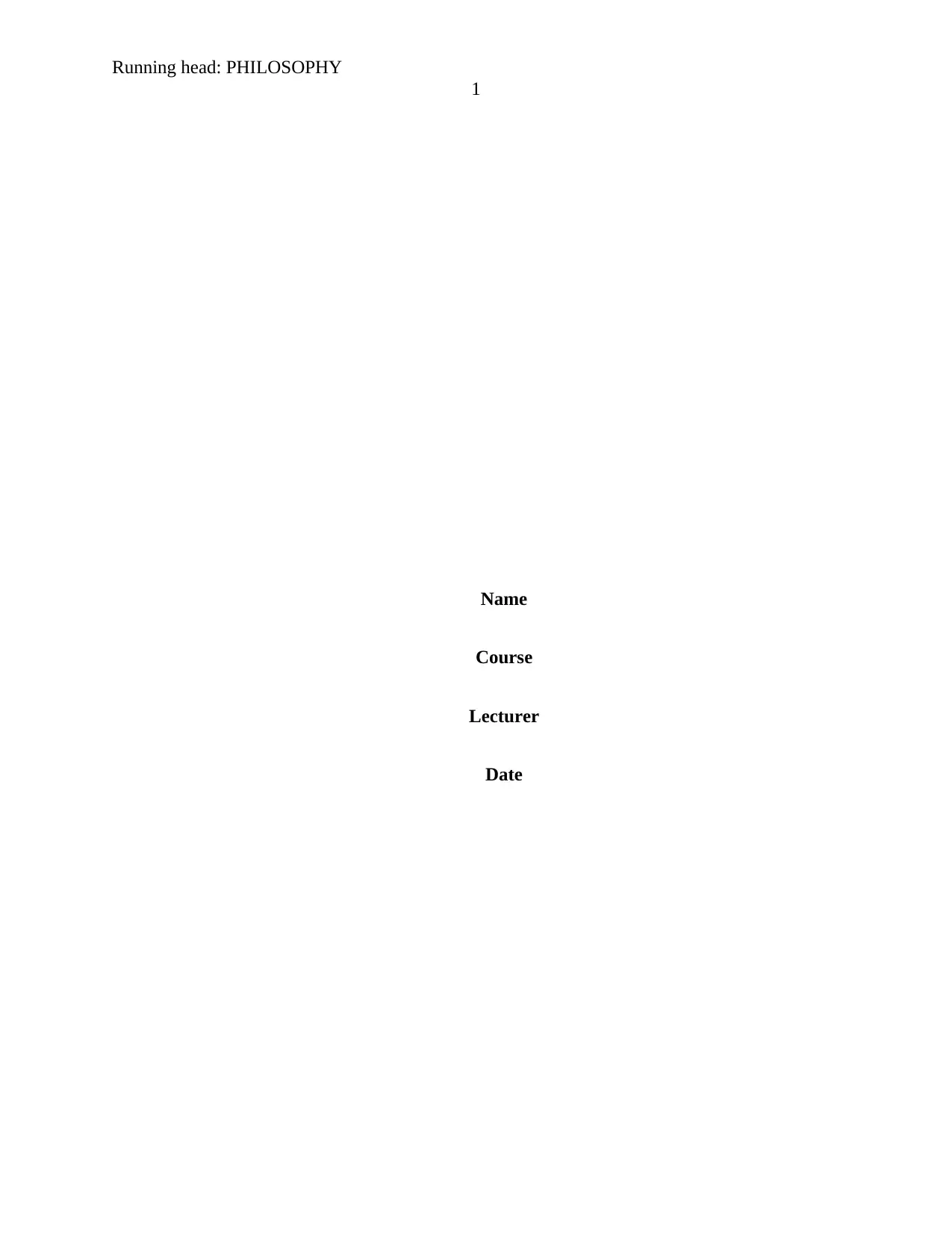
Running head: PHILOSOPHY
1
Name
Course
Lecturer
Date
1
Name
Course
Lecturer
Date
Paraphrase This Document
Need a fresh take? Get an instant paraphrase of this document with our AI Paraphraser
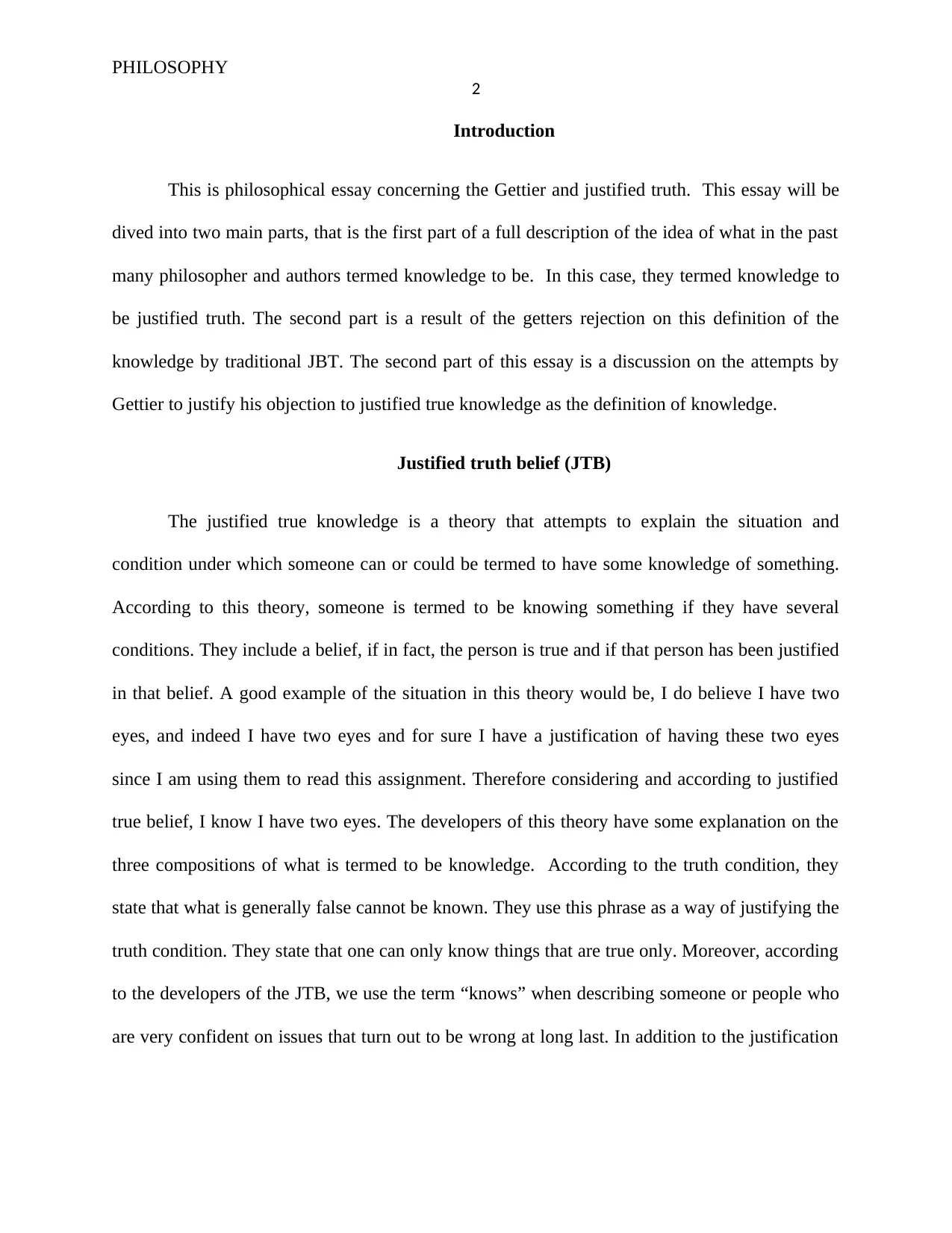
PHILOSOPHY
2
Introduction
This is philosophical essay concerning the Gettier and justified truth. This essay will be
dived into two main parts, that is the first part of a full description of the idea of what in the past
many philosopher and authors termed knowledge to be. In this case, they termed knowledge to
be justified truth. The second part is a result of the getters rejection on this definition of the
knowledge by traditional JBT. The second part of this essay is a discussion on the attempts by
Gettier to justify his objection to justified true knowledge as the definition of knowledge.
Justified truth belief (JTB)
The justified true knowledge is a theory that attempts to explain the situation and
condition under which someone can or could be termed to have some knowledge of something.
According to this theory, someone is termed to be knowing something if they have several
conditions. They include a belief, if in fact, the person is true and if that person has been justified
in that belief. A good example of the situation in this theory would be, I do believe I have two
eyes, and indeed I have two eyes and for sure I have a justification of having these two eyes
since I am using them to read this assignment. Therefore considering and according to justified
true belief, I know I have two eyes. The developers of this theory have some explanation on the
three compositions of what is termed to be knowledge. According to the truth condition, they
state that what is generally false cannot be known. They use this phrase as a way of justifying the
truth condition. They state that one can only know things that are true only. Moreover, according
to the developers of the JTB, we use the term “knows” when describing someone or people who
are very confident on issues that turn out to be wrong at long last. In addition to the justification
2
Introduction
This is philosophical essay concerning the Gettier and justified truth. This essay will be
dived into two main parts, that is the first part of a full description of the idea of what in the past
many philosopher and authors termed knowledge to be. In this case, they termed knowledge to
be justified truth. The second part is a result of the getters rejection on this definition of the
knowledge by traditional JBT. The second part of this essay is a discussion on the attempts by
Gettier to justify his objection to justified true knowledge as the definition of knowledge.
Justified truth belief (JTB)
The justified true knowledge is a theory that attempts to explain the situation and
condition under which someone can or could be termed to have some knowledge of something.
According to this theory, someone is termed to be knowing something if they have several
conditions. They include a belief, if in fact, the person is true and if that person has been justified
in that belief. A good example of the situation in this theory would be, I do believe I have two
eyes, and indeed I have two eyes and for sure I have a justification of having these two eyes
since I am using them to read this assignment. Therefore considering and according to justified
true belief, I know I have two eyes. The developers of this theory have some explanation on the
three compositions of what is termed to be knowledge. According to the truth condition, they
state that what is generally false cannot be known. They use this phrase as a way of justifying the
truth condition. They state that one can only know things that are true only. Moreover, according
to the developers of the JTB, we use the term “knows” when describing someone or people who
are very confident on issues that turn out to be wrong at long last. In addition to the justification
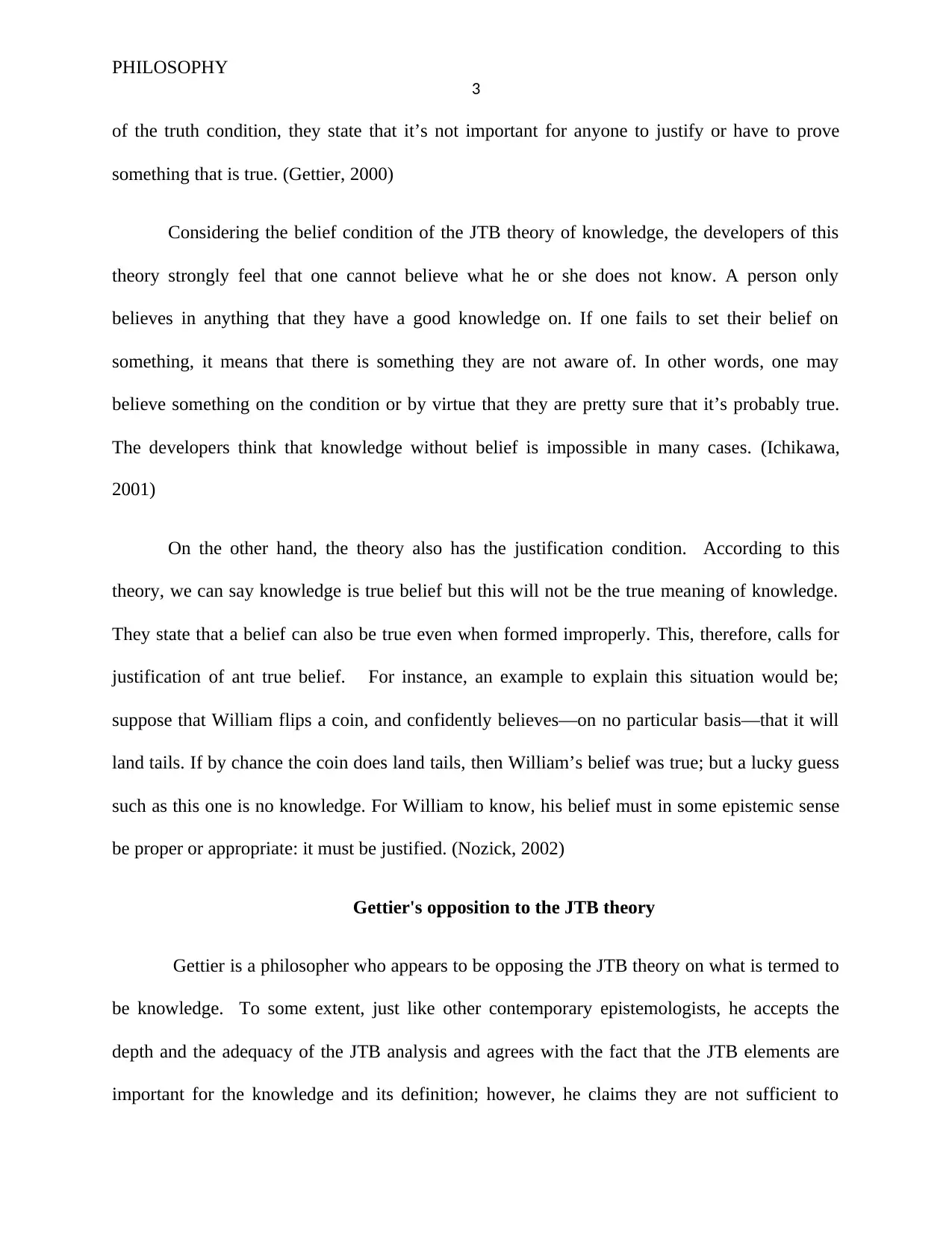
PHILOSOPHY
3
of the truth condition, they state that it’s not important for anyone to justify or have to prove
something that is true. (Gettier, 2000)
Considering the belief condition of the JTB theory of knowledge, the developers of this
theory strongly feel that one cannot believe what he or she does not know. A person only
believes in anything that they have a good knowledge on. If one fails to set their belief on
something, it means that there is something they are not aware of. In other words, one may
believe something on the condition or by virtue that they are pretty sure that it’s probably true.
The developers think that knowledge without belief is impossible in many cases. (Ichikawa,
2001)
On the other hand, the theory also has the justification condition. According to this
theory, we can say knowledge is true belief but this will not be the true meaning of knowledge.
They state that a belief can also be true even when formed improperly. This, therefore, calls for
justification of ant true belief. For instance, an example to explain this situation would be;
suppose that William flips a coin, and confidently believes—on no particular basis—that it will
land tails. If by chance the coin does land tails, then William’s belief was true; but a lucky guess
such as this one is no knowledge. For William to know, his belief must in some epistemic sense
be proper or appropriate: it must be justified. (Nozick, 2002)
Gettier's opposition to the JTB theory
Gettier is a philosopher who appears to be opposing the JTB theory on what is termed to
be knowledge. To some extent, just like other contemporary epistemologists, he accepts the
depth and the adequacy of the JTB analysis and agrees with the fact that the JTB elements are
important for the knowledge and its definition; however, he claims they are not sufficient to
3
of the truth condition, they state that it’s not important for anyone to justify or have to prove
something that is true. (Gettier, 2000)
Considering the belief condition of the JTB theory of knowledge, the developers of this
theory strongly feel that one cannot believe what he or she does not know. A person only
believes in anything that they have a good knowledge on. If one fails to set their belief on
something, it means that there is something they are not aware of. In other words, one may
believe something on the condition or by virtue that they are pretty sure that it’s probably true.
The developers think that knowledge without belief is impossible in many cases. (Ichikawa,
2001)
On the other hand, the theory also has the justification condition. According to this
theory, we can say knowledge is true belief but this will not be the true meaning of knowledge.
They state that a belief can also be true even when formed improperly. This, therefore, calls for
justification of ant true belief. For instance, an example to explain this situation would be;
suppose that William flips a coin, and confidently believes—on no particular basis—that it will
land tails. If by chance the coin does land tails, then William’s belief was true; but a lucky guess
such as this one is no knowledge. For William to know, his belief must in some epistemic sense
be proper or appropriate: it must be justified. (Nozick, 2002)
Gettier's opposition to the JTB theory
Gettier is a philosopher who appears to be opposing the JTB theory on what is termed to
be knowledge. To some extent, just like other contemporary epistemologists, he accepts the
depth and the adequacy of the JTB analysis and agrees with the fact that the JTB elements are
important for the knowledge and its definition; however, he claims they are not sufficient to
⊘ This is a preview!⊘
Do you want full access?
Subscribe today to unlock all pages.

Trusted by 1+ million students worldwide
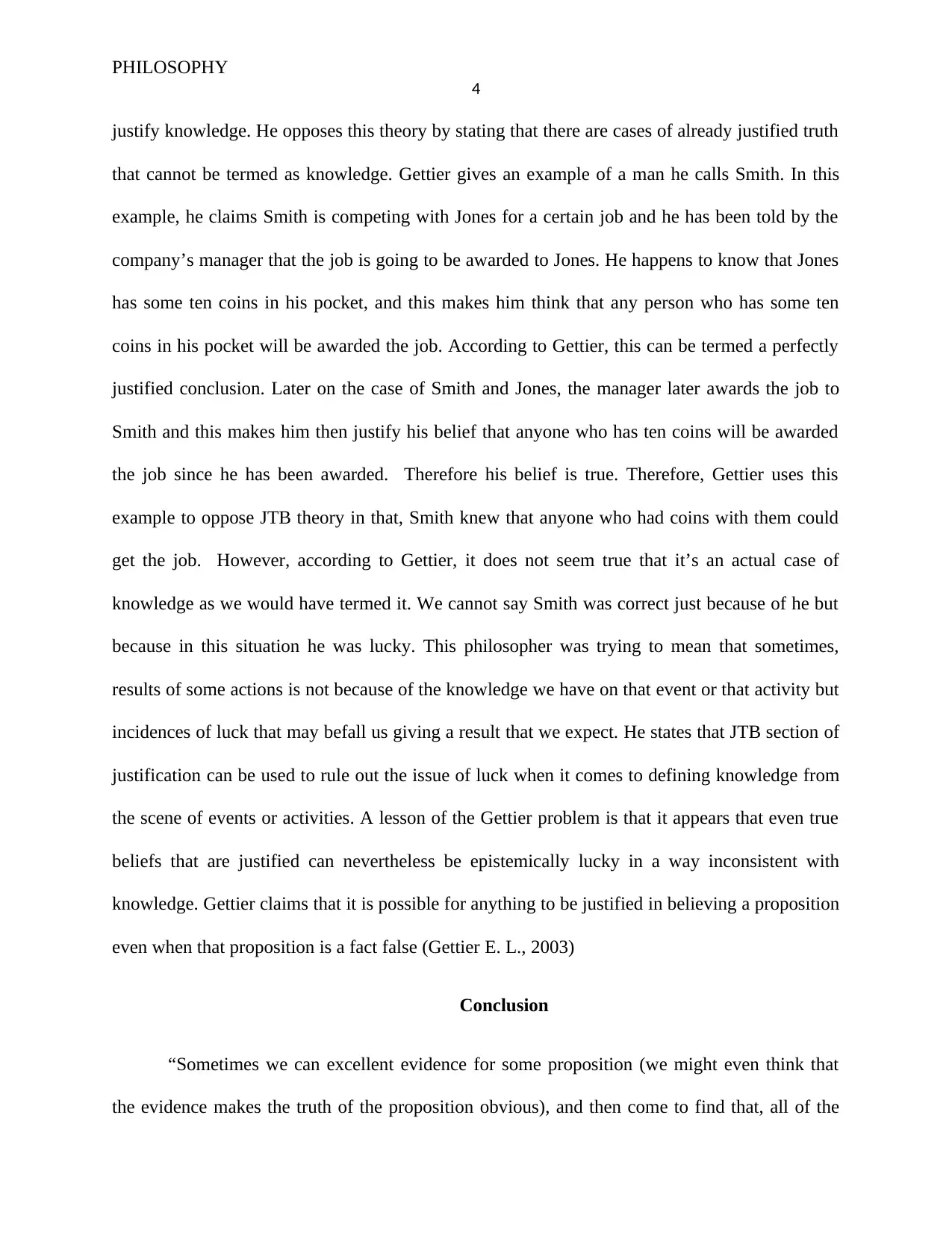
PHILOSOPHY
4
justify knowledge. He opposes this theory by stating that there are cases of already justified truth
that cannot be termed as knowledge. Gettier gives an example of a man he calls Smith. In this
example, he claims Smith is competing with Jones for a certain job and he has been told by the
company’s manager that the job is going to be awarded to Jones. He happens to know that Jones
has some ten coins in his pocket, and this makes him think that any person who has some ten
coins in his pocket will be awarded the job. According to Gettier, this can be termed a perfectly
justified conclusion. Later on the case of Smith and Jones, the manager later awards the job to
Smith and this makes him then justify his belief that anyone who has ten coins will be awarded
the job since he has been awarded. Therefore his belief is true. Therefore, Gettier uses this
example to oppose JTB theory in that, Smith knew that anyone who had coins with them could
get the job. However, according to Gettier, it does not seem true that it’s an actual case of
knowledge as we would have termed it. We cannot say Smith was correct just because of he but
because in this situation he was lucky. This philosopher was trying to mean that sometimes,
results of some actions is not because of the knowledge we have on that event or that activity but
incidences of luck that may befall us giving a result that we expect. He states that JTB section of
justification can be used to rule out the issue of luck when it comes to defining knowledge from
the scene of events or activities. A lesson of the Gettier problem is that it appears that even true
beliefs that are justified can nevertheless be epistemically lucky in a way inconsistent with
knowledge. Gettier claims that it is possible for anything to be justified in believing a proposition
even when that proposition is a fact false (Gettier E. L., 2003)
Conclusion
“Sometimes we can excellent evidence for some proposition (we might even think that
the evidence makes the truth of the proposition obvious), and then come to find that, all of the
4
justify knowledge. He opposes this theory by stating that there are cases of already justified truth
that cannot be termed as knowledge. Gettier gives an example of a man he calls Smith. In this
example, he claims Smith is competing with Jones for a certain job and he has been told by the
company’s manager that the job is going to be awarded to Jones. He happens to know that Jones
has some ten coins in his pocket, and this makes him think that any person who has some ten
coins in his pocket will be awarded the job. According to Gettier, this can be termed a perfectly
justified conclusion. Later on the case of Smith and Jones, the manager later awards the job to
Smith and this makes him then justify his belief that anyone who has ten coins will be awarded
the job since he has been awarded. Therefore his belief is true. Therefore, Gettier uses this
example to oppose JTB theory in that, Smith knew that anyone who had coins with them could
get the job. However, according to Gettier, it does not seem true that it’s an actual case of
knowledge as we would have termed it. We cannot say Smith was correct just because of he but
because in this situation he was lucky. This philosopher was trying to mean that sometimes,
results of some actions is not because of the knowledge we have on that event or that activity but
incidences of luck that may befall us giving a result that we expect. He states that JTB section of
justification can be used to rule out the issue of luck when it comes to defining knowledge from
the scene of events or activities. A lesson of the Gettier problem is that it appears that even true
beliefs that are justified can nevertheless be epistemically lucky in a way inconsistent with
knowledge. Gettier claims that it is possible for anything to be justified in believing a proposition
even when that proposition is a fact false (Gettier E. L., 2003)
Conclusion
“Sometimes we can excellent evidence for some proposition (we might even think that
the evidence makes the truth of the proposition obvious), and then come to find that, all of the
Paraphrase This Document
Need a fresh take? Get an instant paraphrase of this document with our AI Paraphraser
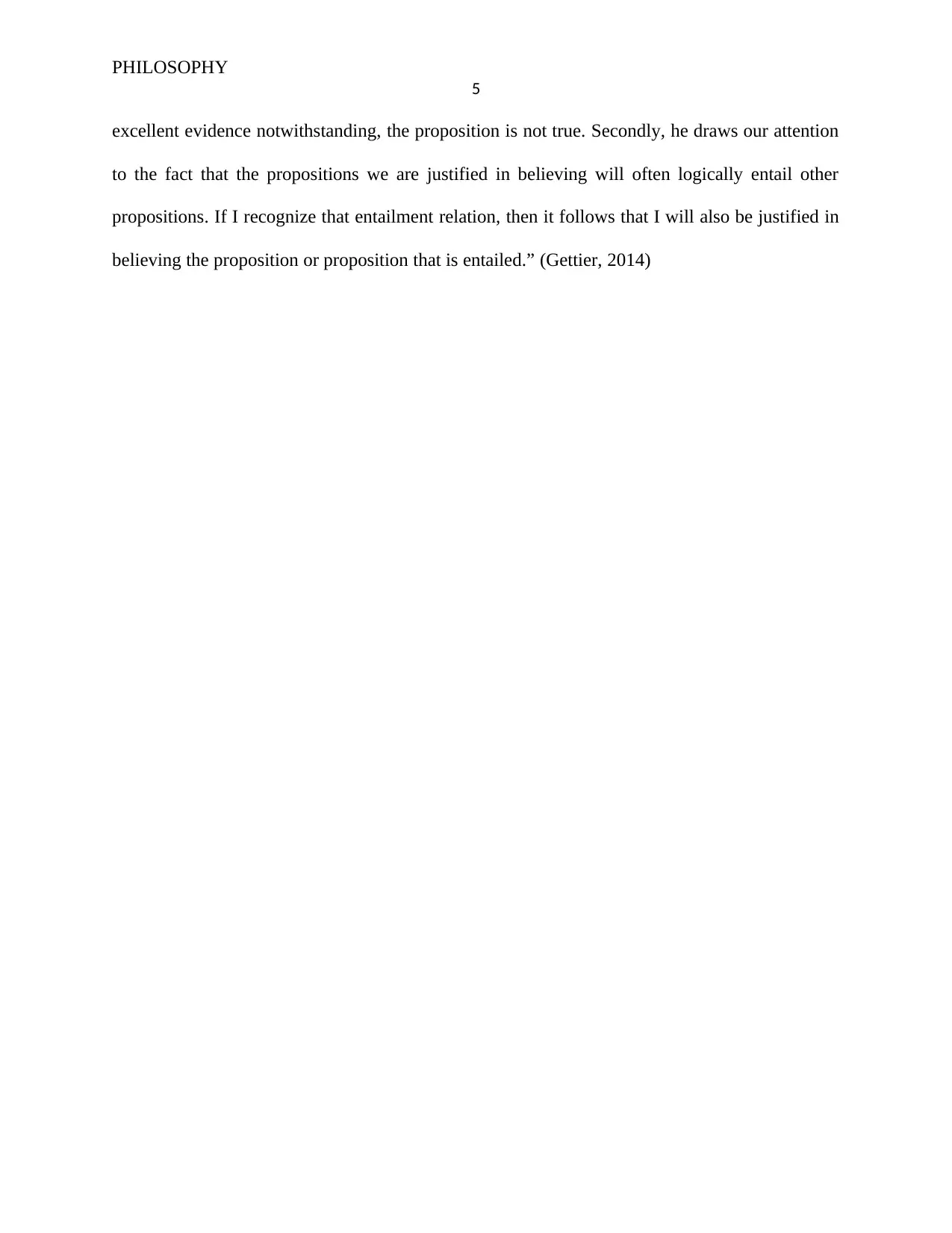
PHILOSOPHY
5
excellent evidence notwithstanding, the proposition is not true. Secondly, he draws our attention
to the fact that the propositions we are justified in believing will often logically entail other
propositions. If I recognize that entailment relation, then it follows that I will also be justified in
believing the proposition or proposition that is entailed.” (Gettier, 2014)
5
excellent evidence notwithstanding, the proposition is not true. Secondly, he draws our attention
to the fact that the propositions we are justified in believing will often logically entail other
propositions. If I recognize that entailment relation, then it follows that I will also be justified in
believing the proposition or proposition that is entailed.” (Gettier, 2014)
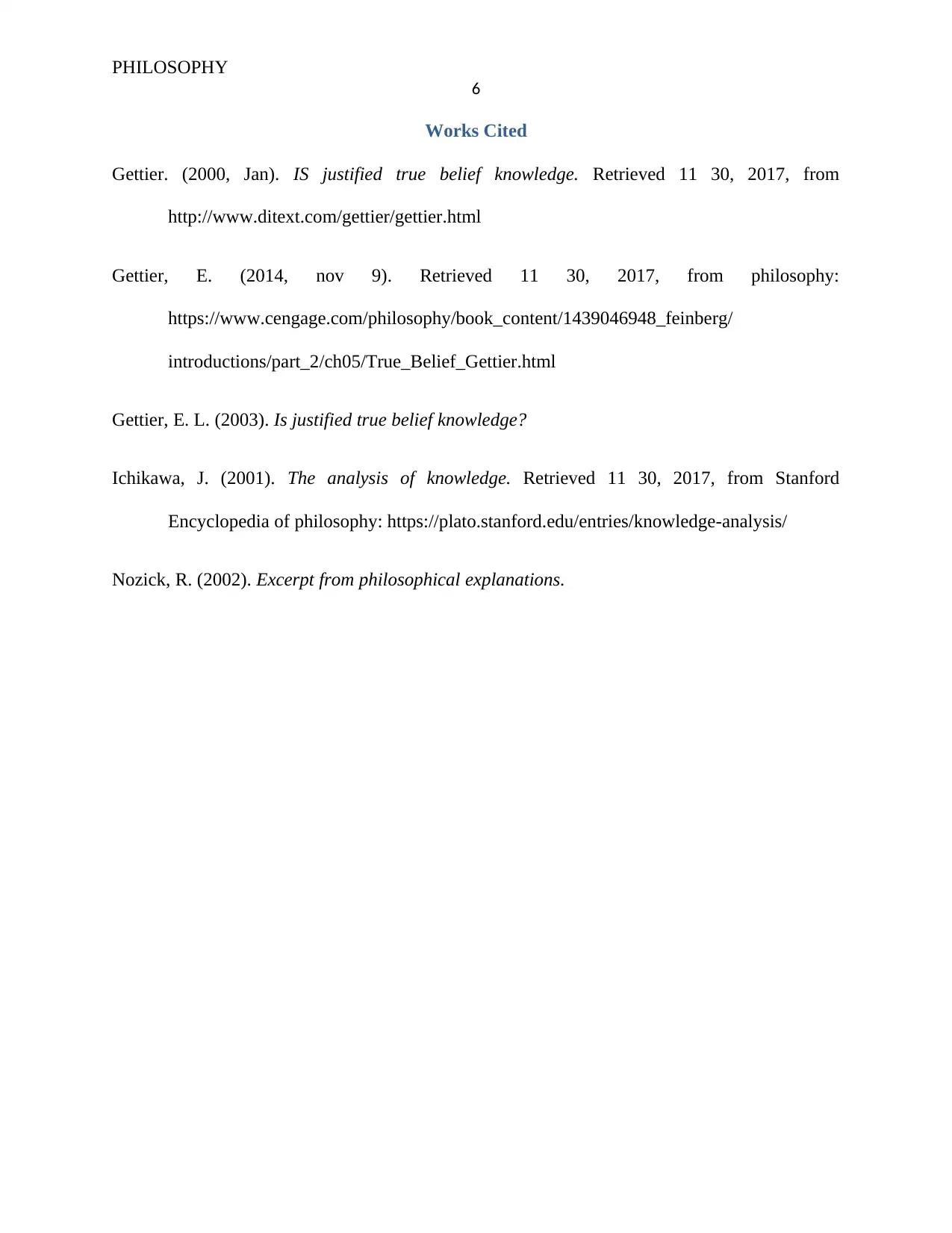
PHILOSOPHY
6
Works Cited
Gettier. (2000, Jan). IS justified true belief knowledge. Retrieved 11 30, 2017, from
http://www.ditext.com/gettier/gettier.html
Gettier, E. (2014, nov 9). Retrieved 11 30, 2017, from philosophy:
https://www.cengage.com/philosophy/book_content/1439046948_feinberg/
introductions/part_2/ch05/True_Belief_Gettier.html
Gettier, E. L. (2003). Is justified true belief knowledge?
Ichikawa, J. (2001). The analysis of knowledge. Retrieved 11 30, 2017, from Stanford
Encyclopedia of philosophy: https://plato.stanford.edu/entries/knowledge-analysis/
Nozick, R. (2002). Excerpt from philosophical explanations.
6
Works Cited
Gettier. (2000, Jan). IS justified true belief knowledge. Retrieved 11 30, 2017, from
http://www.ditext.com/gettier/gettier.html
Gettier, E. (2014, nov 9). Retrieved 11 30, 2017, from philosophy:
https://www.cengage.com/philosophy/book_content/1439046948_feinberg/
introductions/part_2/ch05/True_Belief_Gettier.html
Gettier, E. L. (2003). Is justified true belief knowledge?
Ichikawa, J. (2001). The analysis of knowledge. Retrieved 11 30, 2017, from Stanford
Encyclopedia of philosophy: https://plato.stanford.edu/entries/knowledge-analysis/
Nozick, R. (2002). Excerpt from philosophical explanations.
⊘ This is a preview!⊘
Do you want full access?
Subscribe today to unlock all pages.

Trusted by 1+ million students worldwide
1 out of 6
Related Documents
Your All-in-One AI-Powered Toolkit for Academic Success.
+13062052269
info@desklib.com
Available 24*7 on WhatsApp / Email
![[object Object]](/_next/static/media/star-bottom.7253800d.svg)
Unlock your academic potential
Copyright © 2020–2026 A2Z Services. All Rights Reserved. Developed and managed by ZUCOL.





